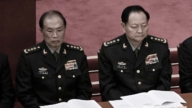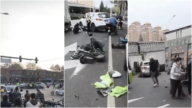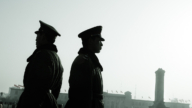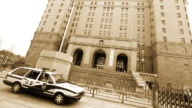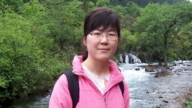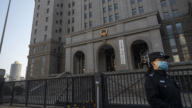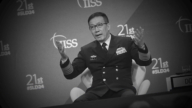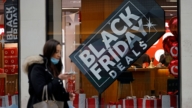【新唐人2013年03月26日讯】中共全国人大法律委员会主任乔晓阳日前表示,香港特首必须由“爱港爱国”的人士担任,不能接受与中央政府对抗的人担任行政长官。这番讲话激起外界的一番论战和批评。而且,乔晓阳提出的“三个坚定不移”,被视为是明确显示了北京的底线。
据报导,乔晓阳是3月24号,在深圳与37名亲中的香港建制派立法会议员举行座谈会时,表明了中共中央对香港特首普选的底线。
香港亲北京政党民建联主席谭耀宗引述乔晓阳的话说,乔提出三个坚定不移,包括:2017年香港普选特首必定落实,绝无拖延﹔行政长官必须是“爱国爱港”人士,跟中央对抗的人必定不能胜任行政长官﹔以及,关于普选的安排按《基本法》及人大常委决定进行。
对于乔晓阳的“爱国爱港”论,香港各界立即作出回应。
香港作家、自由撰稿人张成觉:“他这个所谓爱国,就是爱北京,等于说爱中共,它这个国就是共产党﹔爱港就是一个幌子,你说香港人不爱香港,也很难理解了,是吧?”
香港作家、自由撰稿人张成觉指出,中共的这套说辞是老调子了,主要原因就是它要控制2017年的普选。
张成觉:“它是老调重弹,主要因为2017年普选是一人一票,投票的人就比现在‘小圈子选举’的1600人要多了,所以它就要造这个舆论,等于向香港的民众、香港的老百姓打招呼,你们一定要听我们北京这个指挥棒,否则选出来我们也不承认。等于一种威胁。”
香港公民党主席余若薇对乔晓阳的言论表示非常失望。香港工党主席李卓人则对乔晓阳的说法表示非常不满,他认为,乔晓阳的说法是向香港人宣战。
香港熊立武术舞蹈团团长熊立:“他们是一定要爱共产党,才算是‘爱国爱港’,而我们不是这样认为的,这个标准是完全不同的。共产党就是把党和国家的概念混为一谈,它就是颠倒是非、混淆概念,在这里浑水摸鱼。这个问题不搞清楚,香港的很多问题都无法搞清楚。”
香港熊立武术舞蹈团团长熊立还指出,中共的所谓“爱国爱港”,是以维护共产党的一党专政为标准,与香港市民的核心价值互相冲突。
熊立:“我们的价值观就是人权、自由、民主、法治。我们是爱国家,我们爱的是中华民族,爱的是人民,不一定要去爱共产党。我们把这个东西分的非常清楚的。其实我们认为,要反党,反党才是爱国。只有反共产党才是真正的爱国。”
张成觉也认为,这让大家进一步看清中共面目。
张成觉:“不过他这么一讲,也就提前把2017年这个所谓普选的真面目给揭开了,并不是什么真普选。仅仅是一个游戏,或者是共产党控制下的把戏。共产党做事情有时是这样的,它就是‘我是流氓我怕谁’这么一种逻辑。”
大陆网民则纷纷在微博上留言。
一名网友(sistar陈惠敏)在微博上说,如果香港行政长官连爱国爱港的条件都不能符合,这个人又怎样为香港市民谋福祉呢?
不过,署名微博路人丙的网友质疑,何谓爱港爱国?他留言写道,那些贪官污吏属不属于爱国?那些为人民争取民主却被打入冤狱的人,算不算爱国?一句爱国爱港就窒碍香港应有的民主进程。
更有网友问道:“请问‘爱国爱港证’在什么地方报考?”
香港基本法委员会委员、香港大学法律教授陈弘毅则在23号表示,“爱国爱港”是一个政治概念,不是法律概念。香港《基本法》条文中没有订明“爱国爱港”的要求。
采访/朱智善 编辑/王子琦 后制/萧宇
Beijing’s Demand for Patriotic Executive Triggers Debates in HK
China’s director of NPC Law Committee Qiao Xiaoyang,
recently commented how Hong Kong’s Chief Executive
must first be someone patriotic,
not anyone confronting the central government.
His remarks stirred up controversial discussions and criticism.
Qiao proposed “three resolutions" read as Beijing’s bottom line.
On Mar. 24 during talks with 37 pro-CCP members
from the Hong Kong Legislative Council,
Qiao laid out his bottom line as candidates for
Hong Kong’s Chief Executive.
Tam Yiu-chung, Chairman of Hong Kong pro-Beijing
Party DAB, quoted Qiao’s “three resolutions”:
1) Hong Kong’s Chief Executive by universal suffrage,
must be implemented by 2017 without delay;
2) Chief Executive must be “patriotic" without
confrontation with the central government;
3) Universal suffrage must abide by HK’s Basic Law
and decisions from the Standing Committee of the National People’s Congress.
Local communities in Hong Kong immediately
responded to Qiao’s talks on patriotism.
Hong Kong freelance writer Zhang Chengjue:
“This so-called ‘patriotic’ means love only for Beijing, love only for CCP.
His definition of patriotism equals Party-patriotism,
whereas love for Hong Kong only serves as a camouflage.
It makes no sense at all, why would Hong Kong people
not love their own country ?”
Hong Kong freelance writer Zhang Chengjue pointed out that,
CCP plays an old tune with such dictions.
Its main purpose is to control the universal suffrage in 2017.
Zhang Chengjue: “CCP is simply repeating its cliche.
In the 2017 universal suffrage, each person will have a vote,
different from the current small circle election by 1600 delegates.
Now they issue such public remarks to warm HK people that
they will have to follow the will of Beijing’s order.
Otherwise Beijing will not recognize a publicly
elected executive. This is nothing but a threat.”
Audrey EU, Chairman of Hong Kong’s Civic Party,
expressed deep disappointment at Qiao’s remarks.
Lee Cheuk-yan, Chairman of Hong Kong Labor Party, said he
takes Qiao’s statement as a declaration of war to HK people.
Xiong Li, leader of a Hong Kong Dance company:
“They [CCP] count the love for CCP as love for HK and China,
but we do not believe so. We have different standards.
CCP always confuses the concepts of party and state.
It deliberately muddles right and
wrong to take advantage of the confusion.
Without clarifying this issue, many problems in HK
will remain un-resolved.”
Xiong Li also pointed out that CCP’s so-called patriotism
is to maintain the one-party dictatorship, which conflicts the core values of Hong Kong people.
Xiong Li: “We believe in such values as human rights,
freedom, democracy, and the rule of law.
We do love the country. What we love is the Chinese nation
and Chinese people, not necessarily Chinese Communist Party.
We distinguish between them very clearly.
In fact, we believe that only anti-CPP is real patriotism.”
Zhang Chengjue also believes that Qiao’s remarks
further reveal CCP’s true nature.
Zhang Chengjue: “With these words, Qiao has uncovered the
truth of the so-called universal suffrage of 2017 in advance.
It will not be a genuine universal suffrage but only a game,
or otherwise a trick under CCP’s control.
CCP always follows such logic, “I am indeed a rogue.
What would I be afraid of when I am a rogue?”
Mainland Internet users widely posted on Weibo
about this issue.
A netizen Sistar Chen Huimin said, if the Chief Executive
of Hong Kong is not even patriotic of HK and China,
how can he seek the well-being of Hong Kong people at all?
Internet user Passer-by on Weibo,
questioned what patriotism really means.
He asked in his post, are those corrupt officials patriotic?
Are those political dissidents patriotic when they are jailed
for their fight for democracy and human rights?
The so-called patriotism indeed impedes
HK’s democratic progress.
Some users asked: “Where can we take exams for
this ‘Patriotic Certificate?”
Albert Chen, member of HK Basic Law Committee
and Hong Kong University professor of law,
said on Mar. 23rd that “patriotic" is a political concept,
not a legal concept.
HK Basic Law does not include terms on “patriotism."


